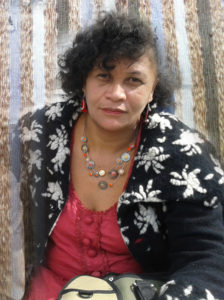It goes without saying that in Vermont, small businesses are king. According to U.S. Small Business Administration, around 59.4 percent of Vermonters are employed by a small business. In the Church Street Marketplace alone, 70 percent of the businesses are locally-owned. So why do we value small businesses so much? The answer is simple: we want to empower our communities. In Antananarivo, Madagascar, Marie Alexandrine Rasoanantenaina is doing just that with her small business that is helping to change the face of poverty in her community. Next month, she will be coming to Burlington to share the story of her life and business, talk about building community through ecological enterprise, and weigh in on women’s development in a modern context.
Marie Alexandrine has been a craftswoman ever since her childhood, when she spent her days helping her grandmother, a dressmaker, sew clothing to sell locally. “When I was 12, I started helping my grandmother since I was not going to school,” she said. “I was from a poor family.” Years later in 1984, she created her own business, Tahiana Création. “Tahiana” literally translates from Malagasy as “blessed,” and thanks to Marie Alexandrine, many women in the local community have been able to earn enough to support their families. “’Tahiana’ means for the grace of God,” she said. “And ‘Création’ means new design.”
In a country where 70 percent of the population is in poverty, according to The World Bank Group, Marie Alexandrine’s business is challenging the statistics. Over the years at Tahiana Création, she has employed numerous women workers to help them provide an income to their families, and ultimately secure the health and education of their children. “My favorite part of having my own business is seeing the women develop their lives,” she said.
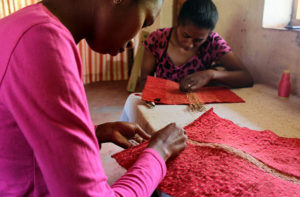
Alongside her mission of empowering the women in her community is Marie Alexandrine’s commitment to using natural products and leaving a small footprint on the environment. In making her crafts, which include handbags, hats, baskets, mats, and others, she uses locally-cultivated plants and natural pigments. The plant that she uses in her weaving now is vetiver, which is known for its therapeutic benefits as a powerful anti-fungal and anti-inflammatory and as a natural cosmetic ingredient in soaps, lotions and fragrances. Vetiver is also a very ecological choice in textile creation. It’s long roots, which grow straight down, help to prevent soil erosion, and its extracts can be used as a natural insect repellent to protect crops.
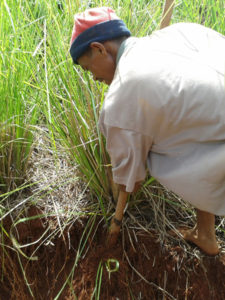
Marie Alexandrine is often referred to as “Madame Vetiver” because of her dedication to the plant, but Tahiana Création did not always make use of it. “Someone asked me for finished vetiver products, but I didn’t know what vetiver was,” said Marie Alexandrine. “Then I did some research.” Her research ultimately led her to start cultivating vetiver as well as how to extract over 40 different pigments from local plants. Her mission is to ensure the value of vetiver from its plantation to being sold on the market as finished products, and to draw from natural resources available in Madagascar.
Even with all of the work that Marie Alexandrine has done over the years to support her local community and protect the environment, she does not plan to slow down anytime soon. She continues to market her products at international craft shows around the world, and her products are now available for sale in the Americas and in Europe. She said that she hopes to continue to expand the business to accommodate more women workers, and to provide for their education. “My dream is to create a training center for young girls who do not go to school so they can avoid early pregnancy.”
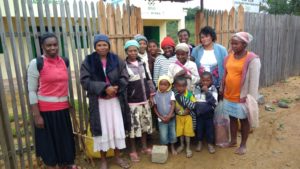
Last year, Marie Alexandrine brought her expertise the annual International Festival in Vermont, where she was hosted by Suzanne Stimik, a board member for the Alliance Française of the Lake Champlain Region. Suzanne says that she was moved by Marie Alexandrine’s warmth and personal history. “She took adversity on with a vengeance and bettered her situation with inner strength and perseverance,” said Suzanne. “As I learned from her, she found her way into business without formal education. By dint of effort, she was able to create a business that employs the neediest and serves her community.”
Suzanne said that since first meeting Marie Alexandrine, she had hoped she would return to Vermont to give a presentation about her life and work. It is a goal of Suzanne’s to be able to promote diversity within the local community by using the AFLCR and French language as a way to connect with immigrants from Francophone Africa and beyond. “What depth we can gain from the cultural richness of our new neighbors,” she said. “Making contacts and potentially developing more ties to these new Vermonters will add to the fabric of our community.”
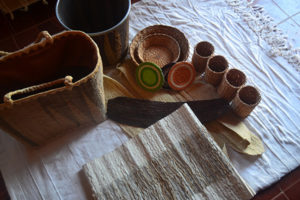
Marie Alexandrine’s presentation and an exposition of her crafts for sale will be held at on Dec. 4 at 7 p.m. at the Old North End Community Center at 20 Allen St. in Burlington. This French and English presentation is free thanks to the Alliance Française of the Lake Champlain Region. More information about her business and products can be found by following the link to her website.
